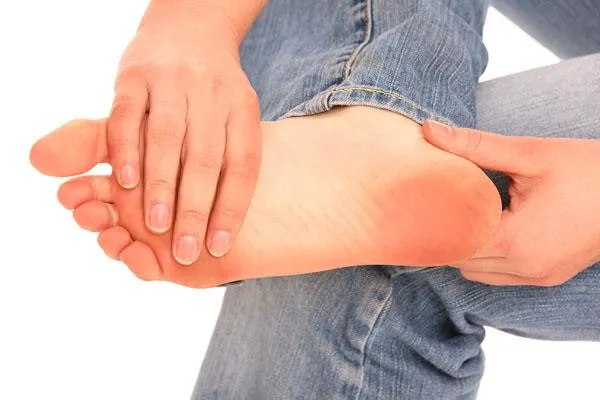
How PRP Therapy Helps with Plantar Fasciitis: A Non-Surgical Solution for Kansas City Residents
Plantar fasciitis is one of the most common causes of heel pain, affecting thousands of people in Kansas City each year. For those suffering from this condition, the pain can be debilitating, often making it difficult to walk, run, or enjoy daily activities. At Trinity Woundcare & Wellness Clinic in Kansas City, Kansas, we offer Platelet-Rich Plasma (PRP) therapy as an effective, non-surgical treatment for plantar fasciitis. This cutting-edge procedure has shown promising results for many of our patients looking for lasting relief without the need for invasive surgery.
In this article, we’ll explore what PRP therapy is, how it works, and why it may be the ideal solution for your plantar fasciitis.
What is PRP Therapy?
PRP therapy involves using your own blood to create a concentrated solution of platelets, growth factors, and proteins that help heal injured tissue. This solution is injected directly into the affected area to accelerate the body’s natural healing process. Since PRP is derived from your own blood, there’s little to no risk of rejection or adverse reactions.
In the case of plantar fasciitis, PRP therapy targets the inflamed tissue along the plantar fascia—the thick band of tissue running along the bottom of your foot.
“PRP therapy has been shown to enhance tissue regeneration and promote healing in chronic conditions such as plantar fasciitis.”
— Journal of Orthopaedic Research, 2022
How Does PRP Therapy Help with Plantar Fasciitis?
The plantar fascia connects your heel bone to the toes and provides support to the arch of your foot. Overuse, poor biomechanics, or tight calf muscles can cause microtears and inflammation in the fascia, leading to pain, swelling, and difficulty walking. PRP therapy works by:
Stimulating tissue repair: The growth factors in PRP help promote tissue regeneration and healing by stimulating stem cells and enhancing the repair process.
Reducing inflammation: PRP reduces inflammation and swelling in the affected area, which is essential for pain relief and improved mobility.
Improving circulation: PRP enhances blood flow to the injured tissue, bringing in nutrients and oxygen necessary for faster healing.
The PRP Process: What to Expect
At Trinity Woundcare & Wellness, the PRP therapy process is quick, minimally invasive, and performed in-office. Here’s how it works:
Blood draw: A small sample of your blood is drawn, just like a routine lab test.
Centrifugation: The blood is placed in a centrifuge to separate the platelets from other components of your blood, concentrating them for maximum benefit.
Injection: The PRP solution is injected into the area of the plantar fascia where the pain and inflammation are most severe.
Recovery: While you may experience some soreness at the injection site, most patients can return to normal activities within 1-2 days. Full results are typically seen within 4-6 weeks.
Most patients require one or two treatments for optimal results, although Dr. Judy may recommend additional follow-ups based on your progress.
The Benefits of PRP Therapy for Plantar Fasciitis
PRP therapy offers numerous benefits for individuals suffering from plantar fasciitis:
Non-invasive and minimal downtime: Unlike surgery, PRP therapy allows you to avoid the risks and recovery time associated with invasive procedures.
Long-lasting pain relief: By promoting tissue repair and reducing inflammation, PRP therapy provides lasting relief from chronic heel pain.
Improved mobility: After treatment, many patients notice improved flexibility and range of motion in the affected foot.
Natural healing process: Since the therapy uses your body’s own platelets, there is no risk of foreign substances being introduced into the body.
“Injections of PRP have demonstrated significant improvements in pain levels, function, and quality of life for patients with chronic plantar fasciitis.”
— Orthopedic Journal of Sports Medicine, 2021
Is PRP Therapy Right for You?
PRP therapy is ideal for patients who have chronic plantar fasciitis that hasn’t responded to other treatments such as physical therapy, stretching, or medications. It is also a great option for individuals who want to avoid surgery and its associated risks.
However, it’s important to note that PRP therapy may not be appropriate for everyone. Patients with certain conditions, such as blood disorders or active infections, may not be good candidates for the procedure.
To determine if PRP therapy is the right treatment for you, Dr. Judy will evaluate your condition, review your medical history, and discuss your options during a consultation.
Learn more about PRP Therapy at Trinity »
Why Choose Trinity Woundcare & Wellness?
At Trinity Woundcare & Wellness, we are committed to providing state-of-the-art treatments with a focus on healing and patient-centered care. Led by Dr. Judy, our clinic combines advanced medical solutions with a holistic approach to ensure the best outcomes for our Kansas City patients.
If you’re ready to take the next step toward healing your plantar fasciitis, call us at 913-285-5553 or visit us at 8043 State Ave, Kansas City, KS 66112 to schedule your PRP therapy consultation today.
About the Author
Dr. Judy holds a Doctorate in Nursing Practice from the University of Kansas and has over 24 years of experience in healthcare. With a focus on wound care, regenerative medicine, and integrative therapies, Dr. Judy provides personalized, effective treatments for chronic pain and injuries. She is dedicated to helping Kansas City residents live pain-free and active lives through innovative therapies like PRP.
Keywords
PRP therapy Kansas City, plantar fasciitis treatment Kansas City KS, PRP injections for foot pain, regenerative medicine Kansas City, heel pain relief Kansas City, Dr. Judy PRP therapy, non-surgical plantar fasciitis treatment, platelet-rich plasma Kansas City, chronic heel pain Kansas City, Trinity Woundcare & Wellness Clinic
